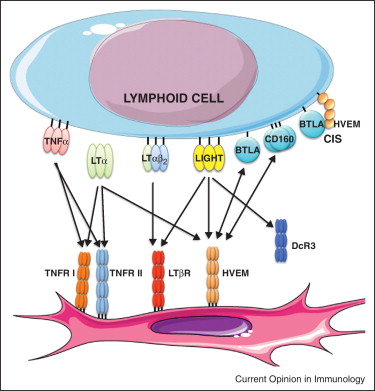What is TNFSF14 Protein
TNFSF14 protein, also known as LIGHT protein or CD258, is a member of the tumor necrosis factor superfamily (TNFSF), identified due to its significant role in multiple biological functions and associations with various diseases. The TNFSF14 protein, encoded by the TNFSF14 gene, is a multifunctional cytokine involved in the regulation of diverse cellular activities, comprising cell proliferation, apoptosis, and immune regulation.
The Function of TNFSF14 Protein
TNFSF14's primary function is to modulate immune response, which is integral to human health. It assists in maintaining the body's defense mechanism against pathogens and preventing the emergence of malignant cells. As a cytokine, it participates in communications between the body's cells, allowing them to coordinate their defense mechanisms. Additionally, it is crucial in modulating lymphoid cell function, often inducing cell death or apoptosis. This functionality regulates cell numbers, particularly where there's an excessive proliferation that may result in tumors or cellular malignancy.
TNFSF14 Protein-Related Signaling Pathway
The TNFSF14 protein exhibits its function through its participation in TNF signaling pathway. The protein can interact with both herpes virus entry mediator (HVEM), a member of TNF receptor superfamily (TNFRSF), and the lymphotoxin-beta receptor (LTβR), stimulating complex cell signaling networks.
Upon binding to HVEM, TNFSF14 triggers the activation of the nuclear factor kappa-light-chain-enhancer of activated B cells (NF-κB) signaling pathway, thus promoting cell survival and inflammation. The specificity of TNFSF14 binding to HVEM depends on the presence of B and T lymphocyte attenuator (BTLA), another HVEM ligand. However, the binding of LIGHT to HVEM in the absence of BTLA drastically boosts T-cell proliferation and enhances immune responses.
When interacting with LTβR, the TNFSF14 protein plays an integral role in lymphoid tissue organization and splenic microarchitecture maintenance. This interaction contributes to cytotoxic T-cell responses, strengthening the cell-mediated immune responses.

(Carl F Ware, et al. 2013)
TNFSF14 Protein-Related Diseases
The aberrant expression or regulation of TNFSF14 protein associates with several human diseases. Its overexpression can lead to autoimmune conditions like Rheumatoid Arthritis and systemic lupus erythematosus due to enhanced immune responses. The protein also implicates in chronic inflammatory diseases, such as inflammatory bowel disease and asthma.
Moreover, the TNFSF14 protein also possesses a dark side; it has been implicated in cancer pathogenesis. This protein's aberrant expression promotes tumor growth, survival, and invasion in various cancers, including but not limited to breast cancer, gastric cancer, and colorectal cancer.
TNFSF14 Protein's Applications in Biomedical
Growing interest in the biomedical field revolves around the use of TNFSF14 protein in therapeutic applications. With its central role in modulating immune responses, this protein could serve as a potential immunotherapeutic target, particularly in cancer therapy. For instance, by blocking the TNFSF14 protein's actions, we could potentially inhibit cancer growth and metastasis.
TNFSF14 protein's involvement in immune response modulation also indicates its possible use in treating autoimmune diseases. Drugs that inhibit TNFSF14 protein may suppress heightened immune responses, providing symptom relief for patients with autoimmune disorders.
In essence, the TNFSF14 protein's role in essential cellular activities and disease states underscores the need for a more profound understanding of its functions and mechanisms. Whether pursuing treatment possibilities for aiding inne inflammation modulation or cancer treatment, the TNFSF14 protein offers a viable path in the development of targeted therapeutics. As research in this area progresses, so too will our understanding of how best to utilize the TNFSF14 protein's potential to revolutionize biomedical application.
Our Featured Products
| Cat.No. | Product Name | Species | Source (Host) | Tag |
|---|---|---|---|---|
| TNFSF14-217HAF488 | Recombinant Human TNFSF14 Protein, His-tagged, Alexa Fluor 488 conjugated | Human | HEK293 | His |
| TNFSF14-552HAF488 | Recombinant Human TNFSF14 Protein, hFc-tagged, Alexa Fluor 488 conjugated | Human | HEK293 | hFc |
| TNFSF14-217HAF555 | Recombinant Human TNFSF14 Protein, His-tagged, Alexa Fluor 555 conjugated | Human | HEK293 | His |
| TNFSF14-552HAF555 | Recombinant Human TNFSF14 Protein, hFc-tagged, Alexa Fluor 555 conjugated | Human | HEK293 | hFc |
| TNFSF14-217HAF647 | Recombinant Human TNFSF14 Protein, His-tagged, Alexa Fluor 647 conjugated | Human | HEK293 | His |
| TNFSF14-552HAF647 | Recombinant Human TNFSF14 Protein, hFc-tagged, Alexa Fluor 647 conjugated | Human | HEK293 | hFc |
| TNFSF14-217HF | Recombinant Human TNFSF14 Protein, His-tagged, FITC conjugated | Human | HEK293 | His |
| TNFSF14-552HF | Recombinant Human TNFSF14 Protein, hFc-tagged, FITC conjugated | Human | HEK293 | hFc |
References
- Lymphocyte development / Tumour immunology / Cancer immunology: Clinical translation
- Ryan L Bjordahl, ... Carl F Ware, in Current Opinion in Immunology, 2013

